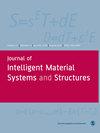带有柔电传感器的抛物面壳体结构的模态信号分析
IF 2.2
3区 材料科学
Q3 MATERIALS SCIENCE, MULTIDISCIPLINARY
Journal of Intelligent Material Systems and Structures
Pub Date : 2024-02-17
DOI:10.1177/1045389x241230113
引用次数: 0
摘要
挠电效应是一种机电耦合梯度效应,近年来受到广泛关注,它广泛存在于介电材料中,在结构传感和致动方面具有巨大的应用潜力。抛物线壳结构的特点是线聚焦,在太阳能槽式集热器和通信天线等关键结构部件中得到广泛应用。对这些抛物面壳体的结构状态进行分布式传感,对于精密结构系统的振动控制、健康监测和形状控制至关重要。因此,基于抛物面壳结构的挠电传感研究已成为一个重要课题。本研究建立了一个具有四面简单支撑边界条件的抛物面壳体挠电传感数学模型。该模型基于直接挠电效应和薄壳假设,并结合了特定的拉梅参数和曲率半径。研究了抛物面壳体上的机电应变梯度/信号产生特性和分布式模态挠电信号。推导了开路条件下的传感信号,分析了不同模态的挠电信号和传感特性。提供了抛物面壳体结构的挠电神经传感信号公式,并将其分为两个部分:圆周弯曲分量和纵向弯曲分量。在案例研究中,对柔电传感器厚度、尺寸和长宽比等设计参数的影响进行了评估和比较。本研究的分析和结果为完善挠性电传感器的设计参数和确定其最佳传感位置提供了理论基础和参考,并有可能为挠性电传感技术的新应用铺平道路。本文章由计算机程序翻译,如有差异,请以英文原文为准。
Modal signal analysis of parabolic shell structures with flexoelectric sensors
The flexoelectric effect, garnering extensive attention in recent years, is an electro-mechanical coupled gradient effect that widely exists in dielectric materials and holds great potential for applications in structural sensing and actuation. The parabolic shell structure, characterized by line focusing, finds widespread use in key structural components such as solar trough collectors and communication antennas. Distributed sensing of the structural states of these parabolic shells is critical for vibration control, health monitoring, and shape control of precision structural systems. Therefore, flexoelectric sensing research based on parabolic shell structure has become an important topic. This study establishes a mathematical model for flexoelectric sensing in a parabolic shell with four-sided simply supported boundary conditions. The model is based on the direct flexoelectric effect, and thin shell assumption, and incorporates specific Lamé parameters and curvature radius. The electro-mechanical strain gradient/signal generation characteristics and distributed modal flexoelectric signals on the parabolic shell are investigated. The sensing signal under the open-circuit conditions is deduced, and the flexoelectric sensing signal and sensing characteristics of different modes are analyzed. The formulation of the flexoelectric neural sensing signal for the parabolic shell structure is provided and divided into two components: a circumferential bending component and a longitudinal bending component. In the case studies, the effects of design parameters such as flexoelectric sensor thickness, size, and aspect ratios are evaluated and compared. The analysis and results of this study offer a theoretical foundation and reference for refining the design parameters of the flexoelectric sensor and determining its optimal sensing position, and potentially paving the way for new applications of flexoelectric sensing technology.
求助全文
通过发布文献求助,成功后即可免费获取论文全文。
去求助
来源期刊
CiteScore
5.40
自引率
11.10%
发文量
126
审稿时长
4.7 months
期刊介绍:
The Journal of Intelligent Materials Systems and Structures is an international peer-reviewed journal that publishes the highest quality original research reporting the results of experimental or theoretical work on any aspect of intelligent materials systems and/or structures research also called smart structure, smart materials, active materials, adaptive structures and adaptive materials.

 求助内容:
求助内容: 应助结果提醒方式:
应助结果提醒方式:


